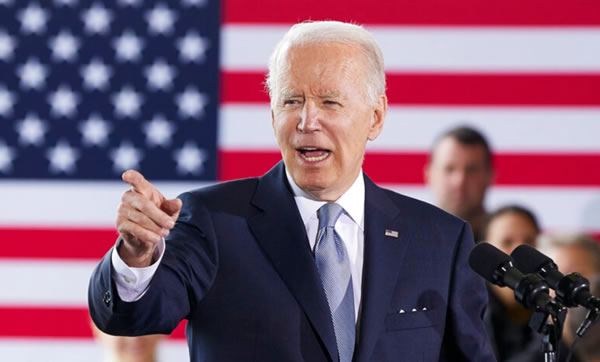
There is almost nothing that the polarised politicians in Washington can agree on these days. Bipartisan co-operation is extremely hard to find.
But there is one issue on which just about everyone sees eye to eye. And that is the value of the Good Friday Agreement (GFA), which ended 30 years of deadly violence in Northern Ireland.
The agreement itself is seen as a shining example of what can be achieved by determined diplomacy and careful negotiation.
American politicians are rightly proud of the role the US played in securing the peace. The tireless work of Senator George Mitchell as well as the intense engagement of President Bill Clinton were essential.
President Biden sees the agreement as part of his own political legacy and can claim credit for encouraging US involvement in the peace process through the 1980s and 90s.
Defending the GFA, and the relative peace it ensures, has been a high priority for the Biden administration. There are deep concerns about how Brexit may affect the agreement.
This presidential visit would not be taking place if the Windsor Framework had not been secured to resolve the issues over trade between Great Britain, Northern Ireland and the Republic. The future of any free trade deal between the UK and US also hangs on the continued maintenance of the GFA.
In Belfast, President Biden will talk about how the US can help to support “Northern Ireland’s vast economic potential”.
In Dublin, he is expected to address the Irish parliament and stress the close co-operation between the two nations. And he will make more personal visits to County Louth and County Mayo to revisit his family roots.
There is a long tradition of US presidents enjoying trips to Ireland more than they do many other official engagements.
Bill Clinton was greeted by ecstatic crowds in 1995 when he became the first American president to visit Northern Ireland as well as the Republic. The New York Times said the “Irish gave Bill Clinton the best two days of his presidency”.
Sixty years ago, John F Kennedy described his Irish trip in 1963 as the best four days of his life.
Since then, presidents Nixon, Reagan, George W Bush, Obama and Trump have all made trips to the Emerald Isle. All to the great envy of many other European countries who do not get nearly so much attention.
The ‘most Irish’ US president in history
Joe Biden is inordinately proud of his personal Irish heritage. He mentions it at every opportunity. Just after he was elected president in 2020 he was asked by my colleague Nick Bryant for a “quick word for the BBC”. He swiftly replied “The BBC? I’m Irish!”
He loves to quote Irish poets and uses the experience of Irish citizens living under British rule as a way to express empathy with persecuted minorities around the world.
The Irish diaspora in America does not have the same outsized influence in US politics as it once did. But with 30 million Americans claiming Irish roots – that is about one in 10 of the current population – it never does any harm for a US president to be seen embracing his Celtic connections.
With 10 of his 16 great grandparents coming from Ireland, Joe Biden is one the most Irish presidents in history.
Edward Blewitt was an engineer and brickmaker who left the west coast town of Ballina, Mayo, in 1850. He decided to head to Scranton in Pennsylvania as the devastating Irish potato famine was causing widespread starvation.
This week, his great-great grandson will be greeted by a huge painted mural of his own face in the town square.
On the east coast of Ireland, the small town of Carlingford in Louth is also expecting a visit. It was from there President Biden’s paternal great-great grandfather, Owen Finnegan, departed in the late 1840s.
These days the people of the Cooley Peninsula are anticipating the construction of a long-awaited bridge across Carlingford Lough that would improve economic links by joining them to Northern Ireland. Locals want to see it named the “Biden Bridge”.
The president can only dream of receiving such a rapturous welcome anywhere in the United States.
Source: BBC























